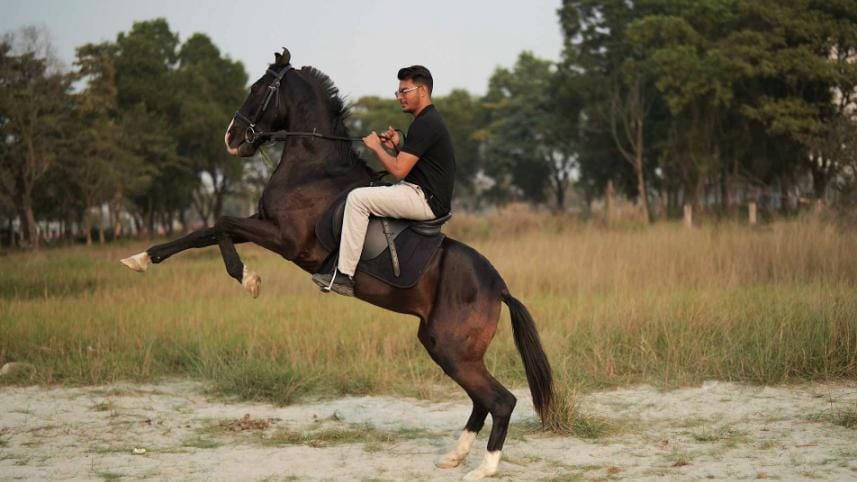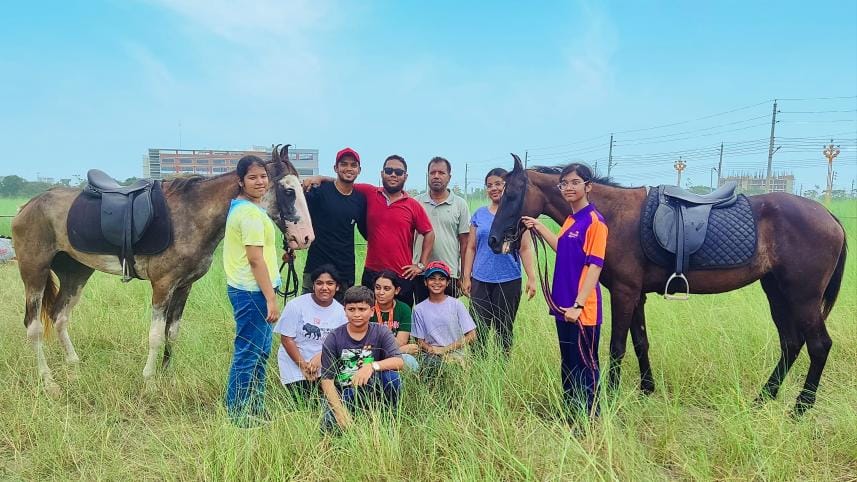Who rides horses in Dhaka? You’ll be surprised

If someone in Dhaka told you they spend their weekends riding horses, your reaction might waver between curiosity and disbelief. In a city defined by honking cars and shrinking fields, horseback riding seems like an activity from another place or another time.
And yet, right now, tucked behind urban housing blocks and along quiet fringes of the city, Dhaka's small but determined horse riding community is growing. Whether it's a hobby, a sport, or a form of therapy, horse riding is no longer limited to the pages of history or colonial nostalgia.

Not just a luxury pastime
Horse riding is often viewed in Bangladesh as something ornamental. Perhaps, a scene for films, music videos, or staged weddings. However, for those who practice it regularly, it's much more than that.
"It's a physical and mental discipline," says Md Jahedul Islam, founder of the Horse Riding Training Center (HRTC). "For the young generation, it's an opportunity to disconnect from the screen and reconnect with their own body. Riding builds strength, balance, and confidence. It boosts immunity. It brings focus."
While horse riding may be new to most urban Bangladeshis, the appeal is surprisingly broad. Riders range from school children and university students to professionals seeking an antidote to desk-bound routines.
"I think people are starting to realise this isn't a showy indulgence. It's a full-body activity with real health benefits," adds Islam.

A city not built for saddles
Dhaka, with its lack of green space and safe public zones, isn't the most logical place for horseback riding. But that's precisely what makes its presence so noteworthy.
"Finding land was our first hurdle," says Sadat Uzzal, founder of Buraq Horse Riding School, which opened in 2023. "We were fortunate to partner with developers who understood our vision, but the city still lacks proper veterinary support, trained caretakers, and infrastructure for this kind of work."
Even simple logistics — sourcing feed, managing riding schedules, keeping horses healthy in humid weather- can feel like running a small army.
Still, both Uzzal and Islam have persisted. And so have their students. What began as a niche hobby is slowly transforming into a real movement. One supported not by spectacle, but by a shared desire to engage with something purposeful.

Beyond the saddle: Riding as identity
The resurgence of horse riding in Dhaka is less about performance and more about participation. Riders are not just posing for Instagram. They are learning to communicate non-verbally, to listen with their bodies, to trust an animal that responds to energy more than words.
"There's no shortcut here," says Uzzal. "You can't fake confidence with a horse. You earn it, over time, by being steady, calm, and present."
That mindset shift often bleeds into other parts of life. Many riders, especially adults, come in looking for escape but leave with something else — a different posture, a clearer head, a new kind of resilience.
Islam echoes this: "You start seeing changes in people. They become more focused, more grounded. Even if they never ride competitively, they take something from the experience."

Hobby, sport, or something more?
So, what's the future of horse riding in Bangladesh? Is it a weekend escape, or a serious sporting pathway?
The answer might be both.
While most riders begin casually, more are now exploring competitive riding, especially tent pegging and show jumping, both of which are practised internationally.
"I don't want this to remain just a hobby," Islam says. "My dream is to take it to the Olympics. Sports like dressage and tent pegging are already recognised worldwide. If the government or private institutions step up, our youth can compete too."
At Buraq, the groundwork for sport is already underway. "We've trained over 350 students, and some of them are interested in going professional," says Uzzal. "We offer certificates, and while they're not yet nationally recognised, they've been used by students applying to equine jobs abroad, especially in Canada and the Gulf."
Still, both founders acknowledge that sport is just one path. Riding also holds value as an extra-curricular credential, a therapeutic practice, and a community activity that fosters confidence, especially for young people.

Building a culture from scratch
If there's one thing both Uzzal and Islam agree on, it's this: Bangladesh didn't have a horse-riding culture before. Whatever exists now is being built from the ground up by trial, by error, and by sheer will.
"In countries such as Saudi Arabia, riding is part of the culture," says Islam. "Here, we're creating that opportunity for the first time. People didn't even know where to begin. Now, at least they have a place to start."
And for Jahedul, this path has never been a solo journey. "I owe everything to my father, Md Farukur Rahaman," he shares. "He supported me when no one else did."
Final gallop
In the grand scheme of Bangladesh's sports infrastructure, equestrianism is barely a blip. But thanks to people like Islam and Uzzal, it's a stubborn, growing dot on the map.
These aren't elite academies catering to the privileged. These are grassroots initiatives led by dreamers — riders who were once told it couldn't be done — now teaching others how to mount up and ride toward something better.
Maybe it's not about medals. Maybe it's about movement. In a city of traffic and tension, that's already a win.
Photo: Buraq Horse Riding School; Horse Riding Training Center (HRTC)



 For all latest news, follow The Daily Star's Google News channel.
For all latest news, follow The Daily Star's Google News channel.
Comments